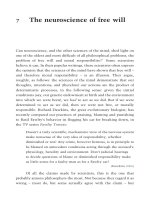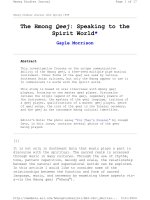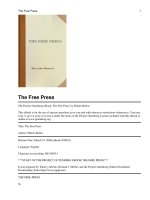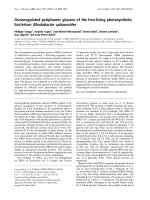THE FREE SPIRIT
Bạn đang xem bản rút gọn của tài liệu. Xem và tải ngay bản đầy đủ của tài liệu tại đây (152.07 KB, 31 trang )
Beyond Good and Evil
CHAPTER II: THE FREE
SPIRIT
24. O sancta simplicitiatas! In what strange
simplification and falsification man lives! One can never
cease wondering when once one has got eyes for
beholding this marvel! How we have made everything
around us clear and free and easy and simple! how we
have been able to give our senses a passport to everything
superficial, our thoughts a godlike desire for wanton
pranks and wrong inferences!—how from the beginning,
we have contrived to retain our ignorance in order to
enjoy an almost inconceivable freedom, thoughtlessness,
imprudence, heartiness, and gaiety—in order to enjoy life!
And only on this solidified, granitelike foundation of
ignorance could knowledge rear itself hitherto, the will to
knowledge on the foundation of a far more powerful will,
the will to ignorance, to the uncertain, to the untrue! Not
as its opposite, but—as its refinement! It is to be hoped,
indeed, that LANGUAGE, here as elsewhere, will not get
over its awkwardness, and that it will continue to talk of
opposites where there are only degrees and many
refinements of gradation; it is equally to be hoped that the
41
of
301
Beyond Good and Evil
incarnated Tartuffery of morals, which now belongs to our
unconquerable ‘flesh and blood,’ will turn the words
round in the mouths of us discerning ones. Here and there
we understand it, and laugh at the way in which precisely
the best knowledge seeks most to retain us in this
SIMPLIFIED, thoroughly artificial, suitably imagined, and
suitably falsified world: at the way in which, whether it
will or not, it loves error, because, as living itself, it loves
life!
25. After such a cheerful commencement, a serious
word would fain be heard; it appeals to the most serious
minds. Take care, ye philosophers and friends of
knowledge, and beware of martyrdom! Of suffering ‘for
the truth’s sake’! even in your own defense! It spoils all the
innocence and fine neutrality of your conscience; it makes
you headstrong against objections and red rags; it stupefies,
animalizes, and brutalizes, when in the struggle with
danger, slander, suspicion, expulsion, and even worse
consequences of enmity, ye have at last to play your last
card as protectors of truth upon earth—as though ‘the
Truth’ were such an innocent and incompetent creature as
to require protectors! and you of all people, ye knights of
the sorrowful countenance, Messrs Loafers and Cobweb-
spinners of the spirit! Finally, ye know sufficiently well
42
of
301
Beyond Good and Evil
that it cannot be of any consequence if YE just carry your
point; ye know that hitherto no philosopher has carried
his point, and that there might be a more laudable
truthfulness in every little interrogative mark which you
place after your special words and favourite doctrines (and
occasionally after yourselves) than in all the solemn
pantomime and trumping games before accusers and law-
courts! Rather go out of the way! Flee into concealment!
And have your masks and your ruses, that ye may be
mistaken for what you are, or somewhat feared! And pray,
don’t forget the garden, the garden with golden trellis-
work! And have people around you who are as a garden—
or as music on the waters at eventide, when already the
day becomes a memory. Choose the GOOD solitude, the
free, wanton, lightsome solitude, which also gives you the
right still to remain good in any sense whatsoever! How
poisonous, how crafty, how bad, does every long war
make one, which cannot be waged openly by means of
force! How PERSONAL does a long fear make one, a
long watching of enemies, of possible enemies! These
pariahs of society, these long-pursued, badly-persecuted
ones—also the compulsory recluses, the Spinozas or
Giordano Brunos—always become in the end, even under
the most intellectual masquerade, and perhaps without
43
of
301
Beyond Good and Evil
being themselves aware of it, refined vengeance-seekers
and poison-Brewers (just lay bare the foundation of
Spinoza’s ethics and theology!), not to speak of the
stupidity of moral indignation, which is the unfailing sign
in a philosopher that the sense of philosophical humour
has left him. The martyrdom of the philosopher, his
‘sacrifice for the sake of truth,’ forces into the light
whatever of the agitator and actor lurks in him; and if one
has hitherto contemplated him only with artistic curiosity,
with regard to many a philosopher it is easy to understand
the dangerous desire to see him also in his deterioration
(deteriorated into a ‘martyr,’ into a stage-and- tribune-
bawler). Only, that it is necessary with such a desire to be
clear WHAT spectacle one will see in any case—merely a
satyric play, merely an epilogue farce, merely the
continued proof that the long, real tragedy IS AT AN
END, supposing that every philosophy has been a long
tragedy in its origin.
26. Every select man strives instinctively for a citadel
and a privacy, where he is FREE from the crowd, the
many, the majority— where he may forget ‘men who are
the rule,’ as their exception;— exclusive only of the case
in which he is pushed straight to such men by a still
stronger instinct, as a discerner in the great and exceptional
44
of
301
Beyond Good and Evil
sense. Whoever, in intercourse with men, does not
occasionally glisten in all the green and grey colours of
distress, owing to disgust, satiety, sympathy, gloominess,
and solitariness, is assuredly not a man of elevated tastes;
supposing, however, that he does not voluntarily take all
this burden and disgust upon himself, that he persistently
avoids it, and remains, as I said, quietly and proudly
hidden in his citadel, one thing is then certain: he was not
made, he was not predestined for knowledge. For as such,
he would one day have to say to himself: ‘The devil take
my good taste! but ‘the rule’ is more interesting than the
exception—than myself, the exception!’ And he would go
DOWN, and above all, he would go ‘inside.’ The long
and serious study of the AVERAGE man—and
consequently much disguise, self-overcoming, familiarity,
and bad intercourse (all intercourse is bad intercourse
except with one’s equals):—that constitutes a necessary
part of the life-history of every philosopher; perhaps the
most disagreeable, odious, and disappointing part. If he is
fortunate, however, as a favourite child of knowledge
should be, he will meet with suitable auxiliaries who will
shorten and lighten his task; I mean so- called cynics, those
who simply recognize the animal, the commonplace and
‘the rule’ in themselves, and at the same time have so
45
of
301
Beyond Good and Evil
much spirituality and ticklishness as to make them talk of
themselves and their like BEFORE WITNESSES—
sometimes they wallow, even in books, as on their own
dung-hill. Cynicism is the only form in which base souls
approach what is called honesty; and the higher man must
open his ears to all the coarser or finer cynicism, and
congratulate himself when the clown becomes shameless
right before him, or the scientific satyr speaks out. There
are even cases where enchantment mixes with the
disgust— namely, where by a freak of nature, genius is
bound to some such indiscreet billy-goat and ape, as in the
case of the Abbe Galiani, the profoundest, acutest, and
perhaps also filthiest man of his century—he was far
profounder than Voltaire, and consequently also, a good
deal more silent. It happens more frequently, as has been
hinted, that a scientific head is placed on an ape’s body, a
fine exceptional understanding in a base soul, an
occurrence by no means rare, especially among doctors
and moral physiologists. And whenever anyone speaks
without bitterness, or rather quite innocently, of man as a
belly with two requirements, and a head with one;
whenever any one sees, seeks, and WANTS to see only
hunger, sexual instinct, and vanity as the real and only
motives of human actions; in short, when any one speaks
46
of
301
Beyond Good and Evil
‘badly’—and not even ‘ill’—of man, then ought the lover
of knowledge to hearken attentively and diligently; he
ought, in general, to have an open ear wherever there is
talk without indignation. For the indignant man, and he
who perpetually tears and lacerates himself with his own
teeth (or, in place of himself, the world, God, or society),
may indeed, morally speaking, stand higher than the
laughing and self- satisfied satyr, but in every other sense
he is the more ordinary, more indifferent, and less
instructive case. And no one is such a LIAR as the
indignant man.
27. It is difficult to be understood, especially when one
thinks and lives gangasrotogati [Footnote: Like the river
Ganges: presto.] among those only who think and live
otherwise—namely, kurmagati [Footnote: Like the
tortoise: lento.], or at best ‘froglike,’ mandeikagati
[Footnote: Like the frog: staccato.] (I do everything to be
‘difficultly understood’ myself!)—and one should be
heartily grateful for the good will to some refinement of
interpretation. As regards ‘the good friends,’ however,
who are always too easy-going, and think that as friends
they have a right to ease, one does well at the very first to
grant them a play-ground and romping-place for
47
of
301
Beyond Good and Evil
misunderstanding—one can thus laugh still; or get rid of
them altogether, these good friends— and laugh then also!
28. What is most difficult to render from one language
into another is the TEMPO of its style, which has its basis
in the character of the race, or to speak more
physiologically, in the average TEMPO of the assimilation
of its nutriment. There are honestly meant translations,
which, as involuntary vulgarizations, are almost
falsifications of the original, merely because its lively and
merry TEMPO (which overleaps and obviates all dangers
in word and expression) could not also be rendered. A
German is almost incapacitated for PRESTO in his
language; consequently also, as may be reasonably inferred,
for many of the most delightful and daring NUANCES of
free, free-spirited thought. And just as the buffoon and
satyr are foreign to him in body and conscience, so
Aristophanes and Petronius are untranslatable for him.
Everything ponderous, viscous, and pompously clumsy, all
long-winded and wearying species of style, are developed
in profuse variety among Germans—pardon me for stating
the fact that even Goethe’s prose, in its mixture of stiffness
and elegance, is no exception, as a reflection of the ‘good
old time’ to which it belongs, and as an expression of
German taste at a time when there was still a ‘German
48
of
301
Beyond Good and Evil
taste,’ which was a rococo-taste in moribus et artibus.
Lessing is an exception, owing to his histrionic nature,
which understood much, and was versed in many things;
he who was not the translator of Bayle to no purpose,
who took refuge willingly in the shadow of Diderot and
Voltaire, and still more willingly among the Roman
comedy-writers—Lessing loved also free-spiritism in the
TEMPO, and flight out of Germany. But how could the
German language, even in the prose of Lessing, imitate the
TEMPO of Machiavelli, who in his ‘Principe’ makes us
breathe the dry, fine air of Florence, and cannot help
presenting the most serious events in a boisterous
allegrissimo, perhaps not without a malicious artistic sense
of the contrast he ventures to present—long, heavy,
difficult, dangerous thoughts, and a TEMPO of the gallop,
and of the best, wantonest humour? Finally, who would
venture on a German translation of Petronius, who, more
than any great musician hitherto, was a master of
PRESTO in invention, ideas, and words? What matter in
the end about the swamps of the sick, evil world, or of the
‘ancient world,’ when like him, one has the feet of a wind,
the rush, the breath, the emancipating scorn of a wind,
which makes everything healthy, by making everything
RUN! And with regard to Aristophanes—that
49
of
301
Beyond Good and Evil
transfiguring, complementary genius, for whose sake one
PARDONS all Hellenism for having existed, provided
one has understood in its full profundity ALL that there
requires pardon and transfiguration; there is nothing that
has caused me to meditate more on PLATO’S secrecy and
sphinx-like nature, than the happily preserved petit fait
that under the pillow of his death-bed there was found no
‘Bible,’ nor anything Egyptian, Pythagorean, or Platonic—
but a book of Aristophanes. How could even Plato have
endured life—a Greek life which he repudiated—without
an Aristophanes!
29. It is the business of the very few to be independent;
it is a privilege of the strong. And whoever attempts it,
even with the best right, but without being OBLIGED to
do so, proves that he is probably not only strong, but also
daring beyond measure. He enters into a labyrinth, he
multiplies a thousandfold the dangers which life in itself
already brings with it; not the least of which is that no one
can see how and where he loses his way, becomes isolated,
and is torn piecemeal by some minotaur of conscience.
Supposing such a one comes to grief, it is so far from the
comprehension of men that they neither feel it, nor
sympathize with it. And he cannot any longer go back! He
cannot even go back again to the sympathy of men!
50
of
301
Beyond Good and Evil
30. Our deepest insights must—and should—appear as
follies, and under certain circumstances as crimes, when
they come unauthorizedly to the ears of those who are not
disposed and predestined for them. The exoteric and the
esoteric, as they were formerly distinguished by
philosophers—among the Indians, as among the Greeks,
Persians, and Mussulmans, in short, wherever people
believed in gradations of rank and NOT in equality and
equal rights—are not so much in contradistinction to one
another in respect to the exoteric class, standing without,
and viewing, estimating, measuring, and judging from the
outside, and not from the inside; the more essential
distinction is that the class in question views things from
below upwards—while the esoteric class views things
FROM ABOVE DOWNWARDS. There are heights of
the soul from which tragedy itself no longer appears to
operate tragically; and if all the woe in the world were
taken together, who would dare to decide whether the
sight of it would NECESSARILY seduce and constrain to
sympathy, and thus to a doubling of the woe? … That
which serves the higher class of men for nourishment or
refreshment, must be almost poison to an entirely different
and lower order of human beings. The virtues of the
common man would perhaps mean vice and weakness in a
51
of
301
Beyond Good and Evil
philosopher; it might be possible for a highly developed
man, supposing him to degenerate and go to ruin, to
acquire qualities thereby alone, for the sake of which he
would have to be honoured as a saint in the lower world
into which he had sunk. There are books which have an
inverse value for the soul and the health according as the
inferior soul and the lower vitality, or the higher and more
powerful, make use of them. In the former case they are
dangerous, disturbing, unsettling books, in the latter case
they are herald-calls which summon the bravest to
THEIR bravery. Books for the general reader are always
ill-smelling books, the odour of paltry people clings to
them. Where the populace eat and drink, and even where
they reverence, it is accustomed to stink. One should not
go into churches if one wishes to breathe PURE air.
31. In our youthful years we still venerate and despise
without the art of NUANCE, which is the best gain of
life, and we have rightly to do hard penance for having
fallen upon men and things with Yea and Nay. Everything
is so arranged that the worst of all tastes, THE TASTE
FOR THE UNCONDITIONAL, is cruelly befooled and
abused, until a man learns to introduce a little art into his
sentiments, and prefers to try conclusions with the
artificial, as do the real artists of life. The angry and
52
of
301









